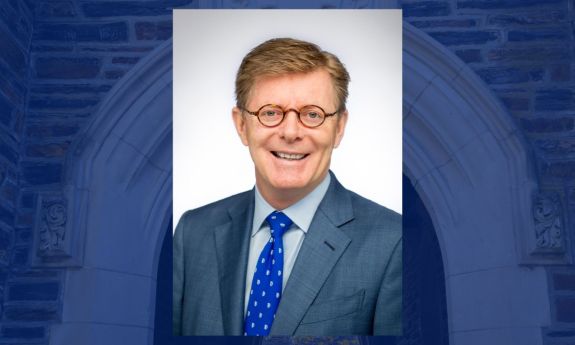Price Addresses Steps to Restore Public Trust in Higher Education

READ MORE
In his annual address to the university faculty, Price reinforced Duke’s commitment to investing in Duke’s people, building strong partnerships in the Durham community and beyond, and engaging Duke alumni around the world.
However, he added that universities have allowed the caricature to spread into mainstream discussion without an effective response.
“We share some responsibility in the sense that we have tended to occupy ourselves with what we want to do, and we don’t always concern ourselves with showing the impact of our work in the world,” Price said.
“We need to take seriously some of these complaints about viewpoint diversity, about entitlement issues, about how one explains the rights that we have as faculty … There are people who don't buy that we are using all our resources to bring a very positive impact on society. They say they need something different than what we provide.
“And we need to be more open to these concerns and not principally see our opponents as standing outside the city walls trying to bring down the enterprise.”
Price acknowledged that some of higher education’s critics may not be interested in conversation. Duke history associate professor Adriane Lentz-Smith noted that the criticism she receives in her public scholarship on the history of white supremacy seeks not to further discussion but to silence unpopular opinions. Others noted that criticism of the Duke School of Medicine’s diversity, equity and inclusion efforts is prompting political leaders to propose legislation attempting to shut these efforts down.
In response, Price said to counter such criticism, the university must do so in a non-partisan way that reflects the university’s values of intellectual freedom and diversity of opinions.
“It's a bedrock of what we do, and it's hard to do it in an environment where you have lost the trust of the public,” said Price, whose scholarly expertise is in political communication. “I think people want to have institutions they can look to as third-party experts who can address contemporary issues. But to occupy that role you must demonstrate you possess a variety of views of the world that give you the credibility to make those statements.”
That includes diversity of political viewpoints, though Price was critical of any pressure to specifically recruit faculty or students based on their preexisting political viewpoints. Instead, what Duke does well, he said, is seek out scholars with a strong variety of life experiences, which are often correlated with political viewpoints, and use that diversity to improve campus discussion.
“As the world around us becomes even more polarizing, it is imperative that our Duke community be one in which we foster open and civil discourse, express our differences in productive ways, and build mutual trust and respect for others in all that we do.”
President Vincent Price
“We are recruiting students from parts of the country where worldviews just are different. Absolutely we should do that, and we benefit from that.”
He also encouraged departments to be sensitive to the discussions in their classes and ensure they are “hospitable to colleagues and students who come from a different perspective.”
Price also referenced the current Israel-Hamas war as raising tensions and concerns about civil discourse and student safety on campus. In his address to the faculty prior to the question session, Price said as divisive voices get stronger in the world, Duke must show that universities are a place where civil discourse can promote and protect community safety.
“As the world around us becomes even more polarizing, it is imperative that our Duke community be one in which we foster open and civil discourse, express our differences in productive ways, and build mutual trust and respect for others in all that we do,” Price said in his address.
He elaborated on those remarks during the question session, acknowledging “the profound suffering” the conflict has caused many people around the world. Those tensions have been felt on campus. He referred to the Initiative on the Middle East launched by Provost Alec Gallimore that is bringing a diversity of speakers to discuss the conflict.
The initiative builds on long-standing university efforts to forge connections on campus among diverse communities. Price praised “the many faculty who have been engaged with this work of investing in people and investing in community. These are two fundamental ways that have positioned Duke well to respond to this conflict.”
In other comments:
-- To an anonymous faculty question about whether Duke could account for carbon emissions associated with its investment holdings, Price said DUMAC, which is responsible for overseeing most of the university’s investments, has taken several positive steps to connect investments to the values in Duke’s Climate Commitment.
He noted that DUMAC has invested in “positive impact” companies that are promoting the UN Sustainable Development Goals and shared that $2 billion of DUMAC’s portfolio‚ or approximately 15% of the long-term pool, is invested to have “positive impacts.”
“DUMAC has also divested from direct cash equity holdings, meaning that it has divested from Carbon Underground 200 companies,” Price said.
-- In response to a faculty member’s question, Price said the expansion of sports betting on college athletics in North Carolina is a significant concern to the university with the protection of Duke’s student-athletes being the leading consideration. “It’s not a negligible risk. It's a problem for all of athletics including professional athletics,” he said. “I'd say we should look to join in common cause with our colleagues who run professional athletic ventures to learn how they're managing through all this.”